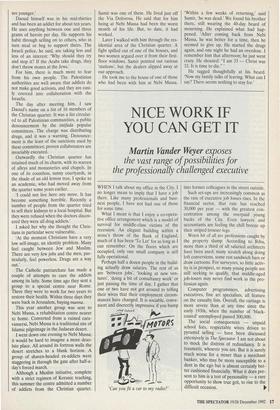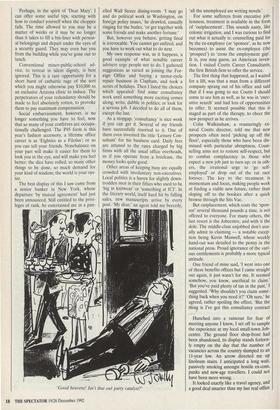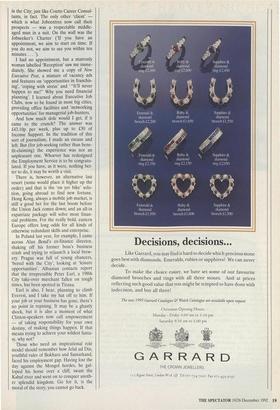NICE WORK IF YOU CAN GET IT
Martin Vander Weyer exposes
the vast range of possibilities for the professionally challenged executive
WHEN I talk about my office in the City, I no longer mean to imply that I have a job there. Like many professionals and busi- ness people, I have not had one of those for some time.
What I mean is that I enjoy a co-opera- tive office arrangement which is a model of survival for middle-class victims of the recession. An elegant building within a stone's throw of the Bank of England, much of it has been 'To Let' for as long as I can remember. On the floors which are occupied, only one small company is still fully operational.
Perhaps half a dozen people in the build- ing actually draw salaries. The rest of us are 'between jobs', 'looking at new ven- tures', 'doing a bit of consultancy work' or just passing the time of day. I gather that one or two have not got around to telling their wives that their employment circum- stances have changed. It is sociable, conve- nient and discreetly impressive if you bump Van you fit a car to my radio?' into former colleagues in the street outside.
Such set-ups are increasingly common as the rate of executive job losses rises. In the financial sector, that rate has reached 30,000 per year — with the greatest con- centration among the overpaid young bucks of the City. Even lawyers and accountants are feeling the chill breeze up their striped trouser-legs.
Worst hit of all are professions caught by the property slump. According to Riba, more than a third of all salaried architects have been axed; many scratch along doing loft conversions, some run sandwich bars or draw cartoons. For surveyors, so little activ- ity is in prospect, so many young people are still seeking to qualify, that middle-aged job-losers may never find work in the pro- fession again.
Computer programmers, advertising executives, fine art specialists, all feature on the casualty lists. Overall, the carnage is more severe than at any time since the early 1930s, when the number of 'black- coated' unemployed passed 300,000.
The social consequences — unpaid school fees, respectable wives driven to pyramid selling — have been discussed extensively in The Spectator. I am not about to mock the distress of redundancy. It is traumatic, whoever you are. But it is surely much worse for a miner than a merchant banker, who may be more susceptible to a dent in the ego but is almost certainly bet- ter cushioned financially. What it does pre- sent to him is a test of personality — a rare opportunity to show true grit, to rise to the difficult occasion.
Perhaps, in the spirit of 'Dear Mary', I can offer some useful tips, starting with how to conduct yourself when the chopper falls. The time allowed to you may be a matter of weeks or it may be no longer than it takes to fill a bin-liner with person- al belongings and depart under the eyes of a security guard. They may even bar you from the building while you've gone out to lunch.
Conventional minor-public-school ad- vice, to retreat in silent dignity, is best ignored. This is a rare opportunity for a short burst of cathartic rage of the sort which you might otherwise pay $10,000 to an exclusive Arizona clinic to induce. The perpetrators of your redundancy should be made to feel absolutely rotten, to provoke them to pay maximum compensation.
Social embarrassment, however, is no longer something you have to feel, now that so many of your confreres are occupa- tionally challenged. The P45 form is this year's fashion accessory, a lifetime office career is as 'Eighties as a Filofax'; or so you can tell your friends. Nonchalance on your part will make it easier for them to look you in the eye, and will make you feel better: the dice have rolled, so many other things to be done, so much demand for your kind of wisdom; the world is your oys- ter.
The best display of this I saw came from a senior banker in New York, whose departure 'by mutual agreement' had just been announced. Still entitled to the privi- leges of rank, he entertained me in a pan- , elled Wall Street dining-room. 'I may go and do political work in Washington, on foreign policy issues,' he drawled, casually ringing for the butler, 'or get together with some friends and make another fortune.'
But, however you behave, getting fired is irrevocable. You cannot get unfired, and you have to work out what to do next.
My own response was, as it happens, a good example of what sensible career advisers urge people not to do. I gathered suggestions as varied as joining the For- eign Office and buying a motor-cycle repair business in Clapham, and took a series of holidays. Then I listed the choices which appealed: find some consultancy work until something more exciting comes along; write; dabble in politics; or look for a serious job. I decided to do all of them, except the last.
As a stopgap, 'consultancy' is nice work if you can get it. Several of my friends have successfully resorted to it. One of them even invented the title 'Leisure Con- sultant' for his business card. Daily fees are attuned to the rates charged by big firms with all the usual office overheads, so if you operate from a briefcase, the money looks quite good.
Other areas of keeping busy are equally crowded with involuntary non-executives. Local politics is a haven for slightly down- trodden men in their fifties who used to be 'big in knitwear' or 'something at ICI'. In the literary world, itself hard hit by falling sales, new manuscripts arrive by every post. 'My dear,' an agent told me breezily,
'Good heavens! Isn't that our party catalyst?'
'all the unemployed are writing novels.'
For some sufferers from executive job- lessness, treatment is available in the form of 'outplacement'. This sounds nasty, like colonic irrigation, and I was curious to find out what it actually is: counselling paid for by the ex-employer (or 'sponsor', as he now becomes) to assist the ex-employee (the 'prospect') to 'cross the employment gap'. It is, you may guess, an American inven- tion. I visited Coutts Career Consultants, the first British firm to offer the service.
The first thing that happened, as I waited for a lift, was that a man from a different company sprang out of his office and said that if I was going to see Coutts I should come to see him as well, as he was in 'exec- utive search' and had lots of opportunities to offer. It seemed possible that this is staged as part of the therapy, to cheer the new prospect as he arrives.
Colin Walkinshaw, a reassuringly ex- naval Coutts director, told me that new prospects often need `picking up off the floor', especially those who have been dis- missed with particular abruptness. Coun- selling aims not to restore self-respect, but to combat complacency in those who expect a new job just to turn up; or in oth- ers, the irrational urge to 'go self- employed' or drop out of the rat race forever. The key to the treatment is momentum and focus, making people work at finding a viable new future, rather than sloping off to the bookies after a quick browse through the Sits Vac.
But outplacement, which costs the `spon- sor' several thousand pounds a time, is not offered to everyone. For many others, the last resort is the Jobcentre, and with it the dole. The middle-class unjobbed don't usu- ally admit to claiming — a notable excep- tion being Kevin Maxwell, whose weekly hand-out was detailed to the penny in the national press. Proud ignorance of the vari- ous entitlements is probably a more typical attitude.
One friend of mine said, `I went into one of these benefits offices but I came straight out again, it just wasn't for me. It seemed somehow, you know, unethical to claim.' 'But you've paid plenty of tax in the past,' I suggested. 'Why shouldn't you claim some- thing back when you need it?' Oh sure,' he agreed, rather spoiling the effect. `But the thing is I've got this consultancy contract Hunched into a raincoat for fear of meeting anyone I knew, I set off to sample the experience at my local small-town Job- centre. The ground floor shop-front had been abandoned, its display stands forlorn- ly empty on the day that the number of vacancies across the country slumped to an 11-year low. An arrow directed me up linoleum stairs. I anticipated a long wait, passively smoking amongst hostile ex-cons, punks and new-age travellers. I could not have been more wrong. It looked exactly like a travel agency, and a good deal smarter than my last real office in the City; just like Coutts Career Consul- tants, in fact. The only other 'client' — which is what Jobcentres now call their prospects — was a respectable middle- aged man in a suit. On the wall was the Jobseeker's Charter (If you have an appointment, we aim to start on time. If you do not, we aim to see you within ten minutes. . . ').
I had no appointment, but a matronly woman labelled 'Reception' saw me imme- diately. She showed me a copy of New Executive Post, a mixture of vacancy ads and features on 'opportunities in franchis- ing', 'coping with stress' and "'It'll never happen to me!" Why you need financial planning'. I learned about Executive Job Clubs, now to be found in most big cities, providing office facilities and 'networking opportunities' for managerial job-hunters.
And how much dole would I get, if it came to the crunch? The answer was £43.10p per week, plus up to £30 of Income Support. In the tradition of this sort of journalism, I made an excuse and left. But (for job-seeking rather than bene- fit-claiming) the experience was not an unpleasant one. Whoever has redesigned the Employment Service is to be congratu- lated. If you have, as it were, nothing bet- ter to do, it may be worth a visit.
There is, however, an alternative last resort (some would place it higher up the order) and that is the 'on yer bike' solu- tion, going abroad to find new fortune. Hong Kong, always a mobile job market, is still a good bet for the last boom before the Union Jack comes down; and an all-in expatriate package will solve most finan- cial problems. For the really bold, eastern Europe offers long odds for all kinds of otherwise redundant skills and enterprise.
In Poland last year, for example, I came across Alan Bond's ex-finance director, shaking off his former boss's business crash and trying to relaunch a local brew- ery. Prague was full of young chancers, 'bored with the City', looking at 'leisure opportunities'. Albanian contacts report that the irrepressible Peter Earl, a 1980s City take-over merchant fallen on tough times, has been spotted in Tirana.
Earl is also, I hear, planning to climb Everest, and I take my hat off to him. If your job or your business has gone, there's no point in repining. It may be a ghastly shock, but it is also a moment of what Clinton-speakers now call empowerment — of taking responsibility for your own destiny, of making things happen. If that means trying to achieve your wildest fanta- sy, why not? Those who need an inspirational role model should remember how Jelal ud Din, youthful ruler of Bokhara and Samarkand, faced his employment gap. Having lost the day against the Mongol hordes, he gal- loped his horse over a cliff, swam the Kabul river and went on to conquer anoth- er splendid kingdom. Go for it, is the moral of the story; you cannot go back.












































































































 Previous page
Previous page